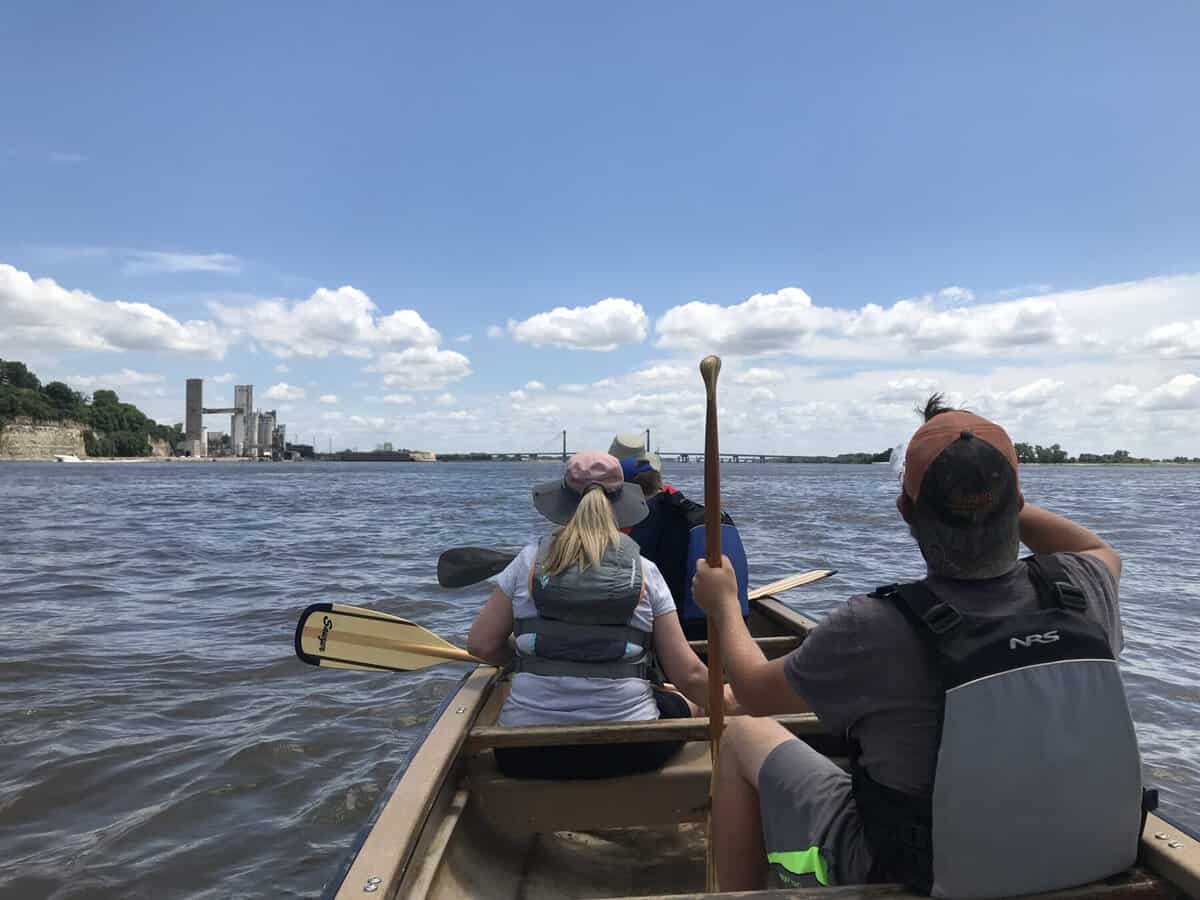How does adding a national park to the region sound? Intriguing? Exciting? Impossible?
Local business leaders are focusing on the first two adjectives as they work to muster support for what they’re calling The Great Rivers National Park. It would be centered at the Alton, Illinois, riverfront and meander past 144 miles of shoreline along the Mississippi, Missouri, and Illinois rivers.
AltonWorks is the group behind this effort. As a developer focused on social impact projects, it says a national park designation would help transform the city of Alton into a vibrant and more livable community, thanks to tens of millions of dollars it estimates could be infused into the area annually from tourism dollars.
The park would feature recreational opportunities at Alton’s Mississippi riverfront, such as kayaking, boating, bike paths, walking trails, a climbing area, and pickleball and basketball courts. The plan would upgrade an existing amphitheater and marina, plus address an ongoing issue with silt deposits.
Currently, an area near the marina requires frequent dredging of silt by the Army Corps of Engineers, but building a dike wall to block silt deposits would eliminate the problem and also create a sheltered area that could be used for canoeing and kayaking, says Kiku Obata, a senior executive at AltonWorks.
Obata and her partners have discussed with the Corps possible dredging solutions as well as the potential for the government agency to provide a master plan for the park at no cost to the city. Because a high percentage of people in Alton live in poverty, the city could be eligible for that funding.
***
How to Become a National Park
The road to national park status is long and involved. Before a plan can even be submitted to the National Park Service (NPS), certain requirements must be met. The proposed area must:
- Possess nationally significant natural, cultural, or recreational resources
- Be a suitable and feasible addition to the National Park System
- Require direct NPS management instead of protection by some other government agency or by the private sector
NPS states that recreational opportunity alone isn’t enough to warrant national park designation. Obata says that Alton’s combination of historical significance and the area’s natural resources will boost their case.

Approaching Alton from the Mississippi River. (Big Muddy Adventures)
“It’s really a no-brainer,” Obata said. “The Mississippi is a national icon, and it has significance in terms of the Native American population, the history of Lewis and Clark, westward expansion, and unfortunately it played a role in the slave trade.”
She adds that Alton itself has considerable historical relevance, most notably the 1837 murder of Elijah Lovejoy, the abolitionist minister and newspaper editor. He was shot by a pro-slavery mob as it sought to destroy his new printing press that had just been delivered by steamship. Alton also was a rival of St. Louis at the time and was considered more important than Chicago.
***
From Multiple Jurisdictions to One
To meet criteria for management of a national park, the area that AltonWorks is proposing includes 135,000 acres in the Great Rivers Confluence Region. This area is managed by 20 federal, state, and local jurisdictions. AltonWorks says that bringing these lands together under NPS would provide consistent trails and amenities and leverage park marketing, maintenance, and funding for better efficiency.
Alton is home to two federal wildlife refuges, a large federal footprint of actively managed Army Corps of Engineers land, and Pere Marquette State Park, the largest state park in Illinois. Also in the area are the National Great Rivers Museum, Great Rivers National Scenic Byway, the National Lewis and Clark Trail, and the Mississippi River National Water Trail.
Because of this federal presence and the massive impact of the Mississippi River on American culture, history, and economic development, AltonWorks believes the idea of a national park is worth exploring.
AltonWorks will present its proposal to Rep. Nikki Budzinski (D-Illinois). (At press time, AltonWorks was finalizing its proposal). If she is in favor of the plan, Budzinski can then submit it to NPS, which conducts a study that takes about two years.
If NPS approves the plan, the final step is approval from Congress.
Perhaps a bigger obstacle lies not in Washington, D.C., but right at Alton’s doorstep. The Argosy Casino Alton, formerly the Alton Belle Casino, sits just north of Riverfront Park and has expressed interest in relocating to the park. This would spoil any chances of earning a national park designation, Obata says.
“If you want a national park, you need a family-friendly environment,” she said. “It would be a completely different brand if you’re driving into Alton and you see a casino and a giant parking lot. That’s why we’re working to galvanize support.”
Obata encourages the public to show its support by commenting on the AltonWorks Facebook or Instagram account.
“We’d love to hear from people,” she said. “We would really like public support.”
In addition to creating an outdoor recreation destination, developing a national park would “preserve the heritage and ecology of this region,” Obata said. “I think it’s totally unappreciated. Driving the River Road is so beautiful. I feel like I’m in southern France. Let’s protect and share these cultural and environmental things of beauty.”
Author: Terri Waters is a regular contributor to Terrain Magazine.
Top Image: An architectural rendering of Alton’s proposed Mississippi riverfront.


No National Parks along the riverfront !!!!!
For too long this area has ignored the biological, ecological, cultural, and historical significance of the mighty Missisippi river and bowed to industries who have degraded our environment. The area that has been proposed is just as signicant as Yellowstone, Denali, The Appalachian Trail, and the Florida Everglades. If petroleum companies and casinos hinder the preservation of this area, then we have failed each other and the earth that we all share.
This proposal would eliminate our public hunting and fishing areas and put it all back in the Federal government’s control which would be a disaster. I strongly oppose this effort.